This step by step diy project is about 12×12 pergola plans. I have designed this 12×12 patio pergola so you can create a shaded area in your backyard with minimum effort and costs. This pergola has a 12×12 roof area and about 10×10 base area. Take a look over the rest of my woodworking plans, if you want to get more building inspiration.
When buying the lumber, you should select the planks with great care, making sure they are straight and without any visible flaws (cracks, knots, twists, decay). Investing in cedar or other weather resistant lumber is a good idea, as it will pay off on the long run. Use a spirit level to plumb and align the components, before inserting the galvanized screws, otherwise the project won’t have a symmetrical look. If you have all the materials and tools required for the project, you could get the job done in about a day. See all my Premium Plans HERE.
Projects made from these plans
Outdoor Pergola Plans
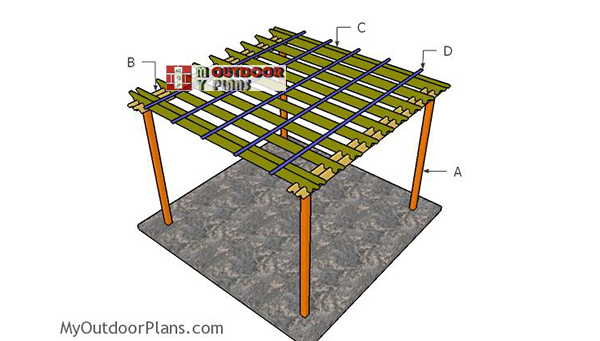
Building-12×12-pergola
Cut & Shopping Lists
- A – 4 pieces of 4×4 lumber – 96″ long POSTS
- B – 4 piece of 2×8 lumber – 144″ long SUPPORT BEAMS
- C – 11 pieces of 2×6 lumber – 144″ long SHADE ELEMENTS
- D – 5 pieces of 1×2 lumber – 144″ long SLATS
- 4 pieces of 4×4 lumber – 8′
- 4 pieces of 2×8 lumber – 12′
- 11 pieces of 2×6 lumber – 12′
- 5 pieces of 1×2 lumber – 12′
- 1 5/8″ screws
- 4×4 post anchor, tube form
- rafter ties
- 8 pieces of 7″ carriage bolt
- wood filler , wood glue, stain/paint
Tools
![]() Hammer, Tape measure, Framing square, Level
Hammer, Tape measure, Framing square, Level
![]() Miter saw, Drill machinery, Screwdriver, Sander
Miter saw, Drill machinery, Screwdriver, Sander
Time
Related
How to build a square pergola
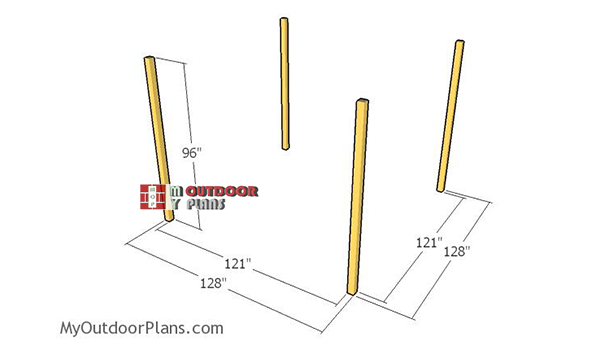
Laying-out-the-posts
The first step of the project is to layout the posts for the pergola. This pergola will have a 12×12 roof, so if you are looking for a pergola with a 12×12 base, you need to make adjustments to these plans. Use batter boards and string to lay out the location for the posts. Apply the 3-4-5 rule to the corners are then make adjustments if necessary.
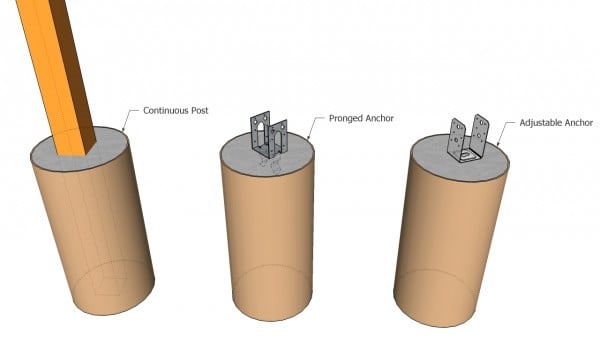
Anchoring the posts of the anchor
There are a few ways to secure the 4×4 posts into place. You can set the posts in concrete or you can use adjustable anchors and pour footings. Dig the holes 3′ deep (or under the front line) and about 12-13′ in diameter. Compact a layer of gravel to the bottom of the holes and then fit the tube forms. Fit the posts, align them and plumb them with a spirit level. Fill the forms with concrete, while the posts are locked into place with temporarily braces. If you use anchors, you need to align and set them into concrete. Fit the posts after the concrete dries, using lag screw.
Smart tip: Read the local building codes, so you dig the holes at the appropriate depth.
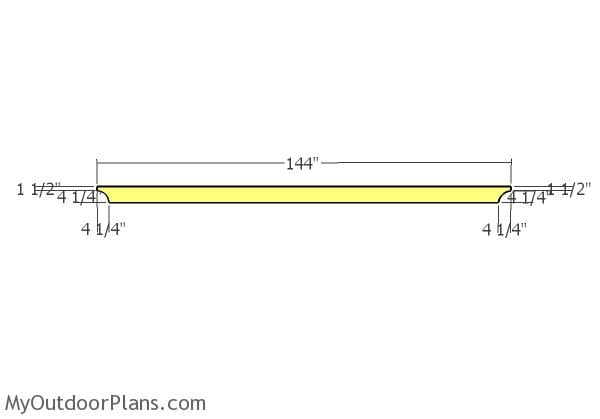
Support beams
Continue the project by fitting the 2×8 support beams to the top of the posts. Make decorative cuts to both ends of the beams and smooth the edges with sandpaper.
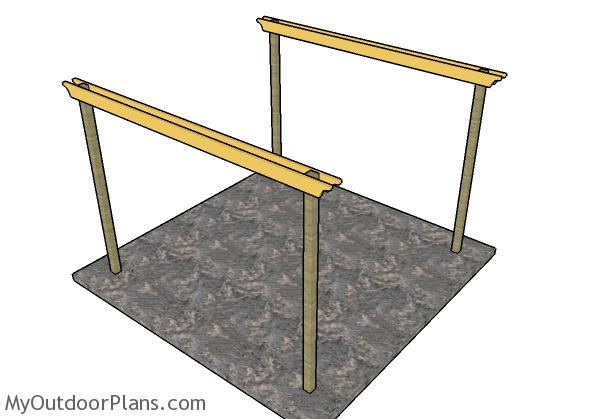
Fitting the support beams
Clamp the support beams to the top of the posts, after making sure the side overhangs are equal (8″). Use a spirit level to check if the support beams are perfectly horizontal and make adjustments, if necessary. Drill pilot holes through the beams and through the posts and insert 7″ carriage bolts to lock them together tightly. Use 2 bolts for each joint, for a proper result.
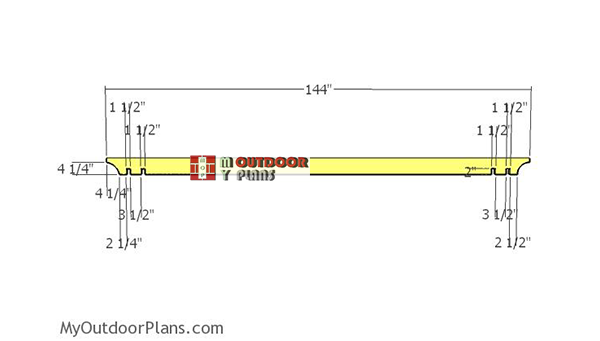
Building-the-shade-elements
Next, you have to build the shade elements from 2×6 lumber. As you can easily notice in the diagram, you have to make decorative cuts to both ends of the beams and then make the notches, so you can secure them into place. Make parallel cuts inside the marked areas with a saw and then clean the notches with a chisel. Clean the recesses with sandpaper.
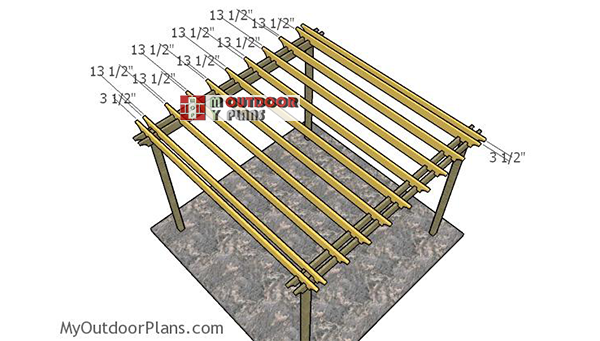
Fitting-the-shade-elements
Fit the shade elements to the top of the pergola. Align the elements with attention and then secure them to the support beams with rafter ties. Alternative, you could drill pilot holes through the top of the shade elements (through the notches) and insert 5 1/2″ screws.
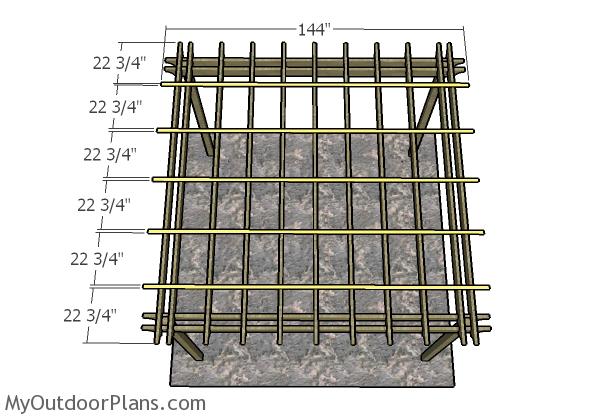
Fitting the top slats
Fit the 1×2 slats to the top of the pergola. Place the slats equally spaced and then center them to the shade elements, so they have 6 1/2″ overhangs on both sides. Drill pilot holes and insert 1 5/8″ screws to secure the slats into place tightly.
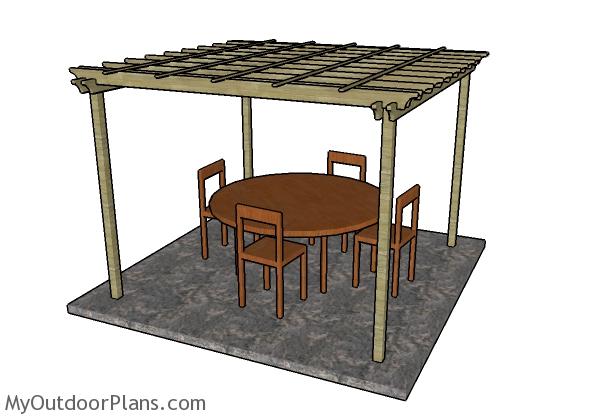
12×12 Pergola Plans
Last but not least, you need to take care of the finishing touches. Therefore, fill the holes with wood putty and then smooth the surface with 120-220 grit sandpaper. You can also fit braces, if you live in a windy area. Apply a few coats of paint or stain over the components, to enhance the look of the pergola and to protect the components from decay.
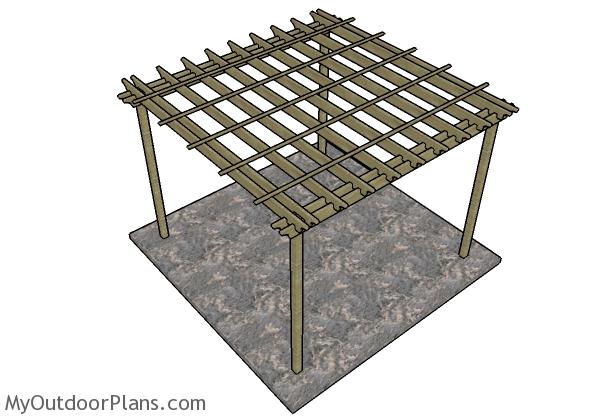
12×12 Pergola Plans Free
This pergola comes in one of the most popular sizes out there, as it is a great compromise between costs and space. The shaded area is large enough for an outdoor set, so you can actually hang out with the loves ones, read a book or even take dinner.
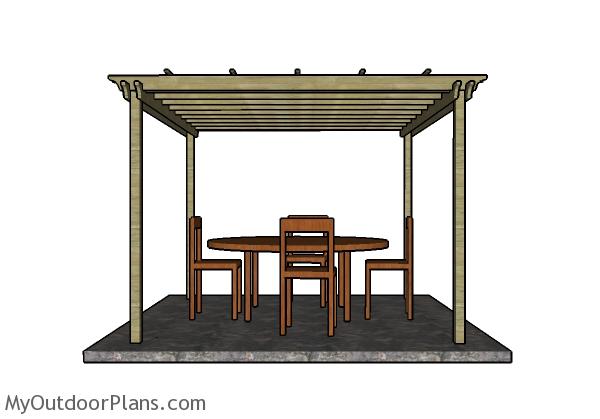
12×12 Pergola Plans – Side view
If you want to add charm and unique appeal to your garden, I recommend you to check out these plans. This 12×12 pergola can be built by any person with basic woodworking skills and it is also very budget friendly. You can make a lot of adjustments to the design so it suits your tastes and needs. Check out the rest of my pergola plans, as I have many designed and sizes you can choose from.
This woodworking project was about square outdoor pergola plans free. If you want to see more outdoor plans, check out the rest of our step by step projects and follow the instructions to obtain a professional result.




